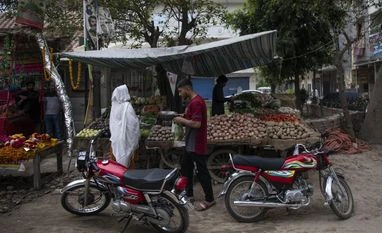Pakistan's inflation outpaces Sri Lanka as Asia's fastest amid food crisis
Consumer prices rose 36.4% in April from a year earlier, the highest since 1964, according to data released by the statistics department Tuesday
Bloomberg By Kamran Haider
Pakistan took the crown for Asia’s fastest inflation from Sri Lanka as a weaker currency and rising food and energy costs drove price gains to a record in April.
Consumer prices rose 36.4% in April from a year earlier, the highest since 1964, according to data released by the statistics department Tuesday. That compares with a median estimate for a 37.2% gain in a Bloomberg survey and a 35.4% increase in March.
The data shows Pakistan’s inflation outpaced price gains in Sri Lanka that eased to 35.3% in April and is starting to show signs of recovery from an economic crisis. The Pakistani rupee is one of the worst performing currencies globally so far in 2023, declining 20% to the dollar, and making imported goods more expensive.
Transport prices climbed 56.8% while food inflation quickened 48.1% in April from a year earlier, data showed. Clothing and footwear prices gained 21.6% and housing, water and electricity costs rose 16.9%.
Pakistan’s inflation is expected to rise further after authorities raised taxes and fuel prices to meet the IMF’s conditions for the revival of a $6.5 billion loan program.
The bailout funds would be crucial for helping Pakistan to pay for essential imports like food and fuel and to avoid a default in the coming months. However, the IMF is seeking financing assurances before restarting aid.
What Bloomberg Economics Says...
The heating up of Pakistan’s inflation in April is unlikely to prompt the central bank to raise rates further. We think the State Bank of Pakistan has already lifted rates high enough and should wait and see the impact of the tightening it has already carried out. Real rates have turned positive on a 12-month forward-looking basis. Our projections suggest inflation will peak in May and then start to gradually slow as food prices cool and a high year-earlier base effects kick in.
—Ankur Shukla, economist
To rein in price pressures, the State Bank of Pakistan hiked its benchmark interest rate last month to 21% — the highest since central bank data going back to 1956. Rising inflation could keep borrowing costs elevated for the South Asian nation that struggling with a slow recovery after last year’s floods.
The next monetary policy review is due on June 12. The central bank said last month that inflation is plateauing but recent data suggests that optimism is misplaced, according to Uzair Younus, a director at Atlantic Council’s South Asia Center.
“The recent numbers provide even more evidence that the central bank continues to be behind the curve,” said Younus. “Most concerning is the continuing upwards march of food prices — over four million citizens have fallen below the poverty line and rising food prices will inflict further generational trauma on countless households.”
High prices is adding further pressure on Prime Minister Shehbaz Sharif who is also grappling with a political crisis. His rival Imran Khan is seeking early elections and has threatened to return to street protests if his demands are not met.
Subscribe to Business Standard digital and get complimentary access to The New York TimesSubscribeRenews automatically, cancel anytime
Here’s what’s included in our digital subscription plans
Access to Exclusive Premium Stories Online
Complimentary Access to The New York Times

News, Games, Cooking, Audio, Wirecutter & The Athletic
Curated Newsletters

Insights on markets, finance, politics, tech, and more delivered to your inbox
Market Analysis & Investment Insights
Seamless Access Across All Devices
)













)
